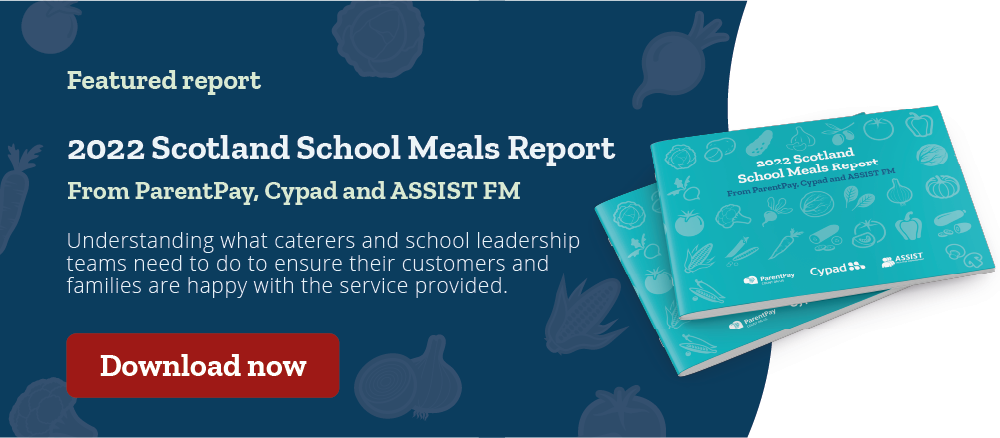Co-written with Mark Hunter, Strategic Lead Food and Facilities Support, East Ayrshire Local Authority
We are partnering with ASSIST FM to co-write a blog series about school meals in Scotland and beyond. Our first blog, More Than a Meal, introduced the wide-ranging role of school caterers in Scotland and beyond. The second, Let’s Cook, examined how school catering teams can play a role in teaching children valuable cooking skills, and the benefits of doing so.
In addition to these collaborative blogs, we recently worked with ASSIST FM to produce our 2022 Scotland School Meals Report; you can download the 2022 Scotland School Meals Report online.
Sustainability and environmental awareness are becoming ever more important in the minds of parents and schoolchildren. In fact, our Scotland School Meals Report found that nearly 1 in 5 parents surveyed said that sustainability and ethical sourcing is “definitely” a factor when choosing school meal provision. 43% of parents of primary children, and 44% of parents of secondary children, reported that sustainability was or somewhat was a factor in their school meal choices, indicating that this is a pervasive concern among parents regardless of school phase.

Mark Hunter, Strategic Lead Food and Facilities Support at East Ayrshire Local Authority tells us, “Sustainability and reducing food waste is always something [local authorities] work towards, and education plays a key role in this. We are always looking at innovative ways to…collaborate with colleagues in other local authorities, learn and share best practice, engage with other sectors and engage with our suppliers and young people.”
Our Scotland School Meals Report also sheds light on an important factor which is likely to be halting progress on the sustainable agenda: a staggering 31% of parents said they would need more information to decide whether sustainability was a factor in school meal choice.
Clearly there is a need to move towards sustainability in school meal provision, but perhaps more urgent is the need to teach parents and schoolchildren (in an age-appropriate way) about issues affecting the environment, and inform them about how their food choices can contribute to a more eco-friendly way of living. For example, could your school choose meals with a focus on seasonal ingredients, to draw attention to the environmental impact of transporting produce from all over the world? Or perhaps adopt ‘meat-free Monday’, to highlight the effect of animal farming on the climate and show that meals can be tasty, filling and nutritionally complete without containing any meat products?

Scotland’s Good Food Futures programme launched in 2019 aims to teach children where food comes from, and more pertinently, put more locally produced healthy food on school menus. Mark explains that to the end of educating more people about sustainable food choices, “food education programmes have been developed by catering teams within most local authorities, that not only reach out to our young people but also our parents, carers and older people within the community”. The classes are led by the catering teams and can be adapted to suit people of different experience and skill levels, but broadly cover “key culinary skills such as food safety, healthy eating, knife skills, cooking on a budget, using local, seasonal and fresh food, all of which are the fundamental layers we would use in our school meals”.
Mark added that in addition to promoting better education around sustainable practices, Scottish local authorities are also focusing on “collaborative partnerships for sustainable food contracts, working with suppliers and producers to support economic growth, and leading the way in their innovative approach to reduce their carbon footprint such as reusable packaging, electric fleet for deliveries, energy efficient buildings and renewable energy”. Within East Ayrshire, the focus is on “supporting local producers and suppliers where we can, using fresh seasonal produce on our menus, and promoting a healthy nutritionally-balanced meal for the young people within our Local Authority”. Parents surveyed in our report agreed this was an important step, with one saying “I think school meals should use Scottish ingredients to support local businesses and farmers”.
For more insights into how sustainability is changing the landscape of school meals and more, download our 2022 Scotland School Meals Report.
